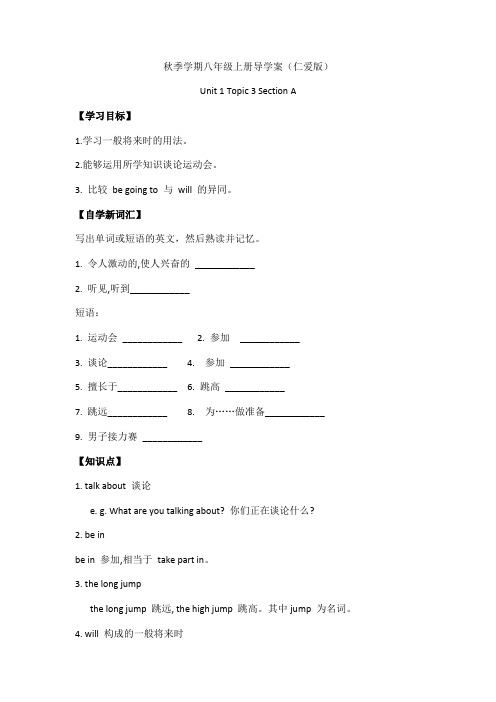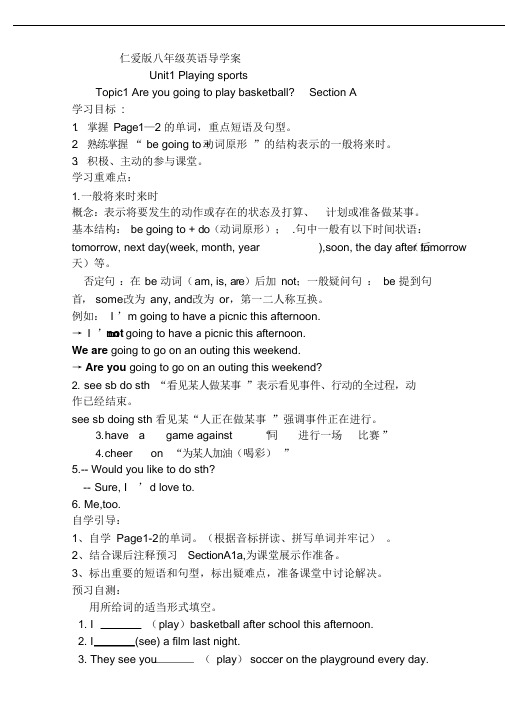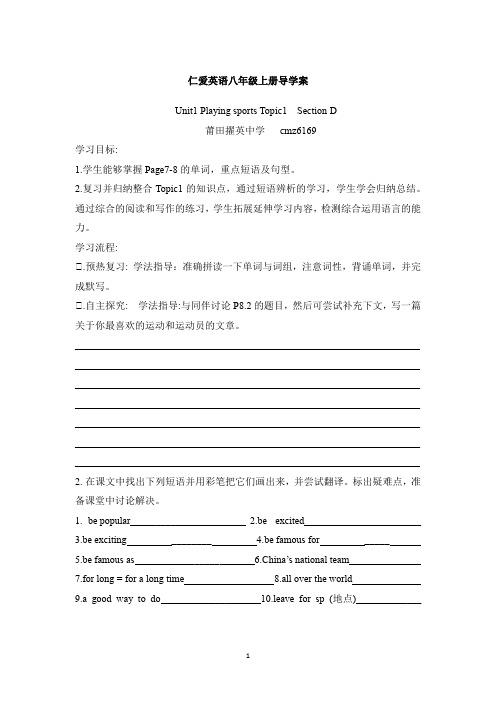年秋季仁爱版英语八年级上册UnitTopic导学案
Unit+1+Topic+3+Section+A+导学案 仁爱版八年级英语上册

秋季学期八年级上册导学案(仁爱版)Unit 1 Topic 3 Section A【学习目标】1.学习一般将来时的用法。
2.能够运用所学知识谈论运动会。
3. 比较be going to 与will 的异同。
【自学新词汇】写出单词或短语的英文,然后熟读并记忆。
1. 令人激动的,使人兴奋的____________2. 听见,听到____________短语:1. 运动会____________2. 参加____________3. 谈论____________4. 参加____________5. 擅长于____________6. 跳高____________7. 跳远____________ 8. 为……做准备____________9. 男子接力赛____________【知识点】1. talk about 谈论e. g. What are you talking about? 你们正在谈论什么?2. be inbe in 参加,相当于take part in。
3. the long jumpthe long jump 跳远, the high jump 跳高。
其中jump 为名词。
4. will 构成的一般将来时will 为一般将来时的助动词,一般将来时的结构为:will +动词原形。
5. Shall I+动词原形?(1) shall 表示“将要,将会”。
(2) shall 只能与第一人称I 和we连用。
shall 为一般将来时的助动词。
e. g. I shall go skating this weekend. 这个周末我要去滑冰。
(3) shall 还可用于疑问句中,表示征询对方意见。
e. g. Shall we have a rest? = Why not have a rest? 我们休息一会儿好吗?6. will构成一般将来时的句型(1)肯定句:主语+ will + 动词原形+其他。
仁爱版八年级英语上册导学案(全册)

仁爱版八年级英语导学案Unit1 Playing sportsTopic1 Are you going to play basketball? Section A学习目标:1.掌握Page1—2 的单词,重点短语及句型。
2.熟练掌握“be going to 动+词原形”的结构表示的一般将来时。
3.积极、主动的参与课堂。
学习重难点:1. 一般将来时来时概念:表示将要发生的动作或存在的状态及打算、计划或准备做某事。
基本结构:be going to + do(动词原形);.句中一般有以下时间状语:后t omorrow tomorrow, next day(week, month, year ),soon, the day afte(r天)等。
否定句:在be 动词(a m, is, are)后加not;一般疑问句:be 提到句首,some改为any, and改为or,第一二人称互换。
例如:I ’m going to have a picnic this afternoon.→I ’n m ot going to have a picnic this afternoon.We are going to go on an outing this weekend.→Are you going to go on an outing this weekend?2. see sb do sth “看见某人做某事”表示看见事件、行动的全过程,动作已经结束。
see sb doing sth 看见某“人正在做某事”强调事件正在进行。
3. have a game against “同进行一场比赛”4. cheer on “为某人加油(喝彩)”5.-- Would you like to do sth?-- Sure, I ’d love to.6. Me,too.自学引导:1、自学Page1-2的单词。
(根据音标拼读、拼写单词并牢记)。
仁爱八年级上册Unit1-Topic1导学案

Unit 1 Topic 1 I’m going to play basketball. Section A一、自主探究1、have a basketball game against…____________2、cheer us on ______________3、prefer rowing ________________4、quite a bit / a lot____________5、join the school rowing club6、打算做某事______________7、看见某人做某事8、看见..正在做... 9、和……相比更喜欢……10、加入某人行列11、参加篮球比赛二、能力提升1、I’m going to play basketball.翻译: .【分析点拨】⑴“be going to + 动词原形”表示将要发生的事或打算、计划、决定要做某事。它常与tomorrow, next week/month/year, in a few days, from now on 等表示将来时间的状语连用。例如:看,快要下雨了。
Look.!It ________ going to ________.⑵be going to在肯定句中的形式be going to结构中的be它一般有三种形式,当主语是I时用______;当主语是第三人称单数时用______;当主语是其他人称时用______。
例如:她明天去看望王先生. She _____ _____ ___ see Mr. Wang tomorrow.⑶含be going to的句子变否定句和一般疑问句由于句子中有be,即在be 的后面加上_______就构成了否定句;把_______放到句首,在句末加问号就构成了一般疑问句.例如:They are going to see the farm next week. (肯定句)They ___________________________ the farm next week. (否定句)-----______________________the farm next week?(一般疑问句)2、I saw you play basketball during the summer holidays. 翻译:。
八年级仁爱英语上册unittopic导学案

Unit 1 Topic 2 Section A 导学案年级:八科目:英语课型:新课执笔人:李爱水审核人:八年级英一、学习目标Aims and demands1、掌握新词汇: mind, kick, pass, somewhere, throw,2、继续学习一般将来时----- will+动词原形二、学法指导How to study1、预习Unit 1 Topic2 Section A,并对语言点、难点做出标记;2、学习学案,并完成学案上的练习题。
三、自主预习在课本中找出下列短语划在书上并翻译1、have a soccer game against Class Three _____________________2、fall ill ______________3、join us ________________________4、kick the ball to you ____________5.pass me the ball ________ 6、never mind_________________ 7.keep trying._____________四、知识链接Hot links1. 【课文原句】But one of my teammates fell ill.(1) one of + 可数名词复数,意为“……中之一”,当它作主语时,谓语动词用______数形式如:One of my friends ____(be) a boy.One of his sisters ______(like) playing the piano.(2) fall ill 生病,得病fall在此为系动词,fall的过去式是______,如:My mother fell ill yesterday, so I have to look after her at home .翻译:_________________________________________She is very weak. She often falls ill. 翻译:_____________2.【课文原句】Will you join us? ----- I'd be glad to.(1) I'd be glad to.是I would be glad to. 的缩写,但to不能省略。
仁爱版八上英语导学案设计Unit 1 Topic 1 Section B

Unit 1 Topic 1 I am going to play basketball.(2)Section B一.知识链接1. 听写sectionA里的生词。
2.分别用be going to和prefer 造句。
二.学习目标1.能区分元音音素[e]和[V]并能正确朗读单词,注意相对应字母组合的书写。
2..能正确朗读句子中的不完全爆破。
3. 能正确运用be going to be 谈论运动爱好及梦想,并在课后写成作文。
三.新知预习1.用红笔标出3——4页生词,并尝试发音和记住。
2.通过看3a区分/e/-- /ei/ 的发音。
3.通过看3b 掌握不完全爆破的发音技巧。
四.探究演练1.通过职业图片,导入新单词,并让学生掌握各种职业的英语表达。
2. 根据姚明的图片,简单介绍对话内容,为学生理解对话做铺垫。
3. 听录音1a,根据对话内容填写表格,让学生在听的基础上掌握Maria和Michael喜欢的运动和运动明星。
4. 观看视频1a,根据对话内容完成1c的填充,让学生巩固对话内容。
5. 通过体育运动和运动员图片展开话题操练,将本课重点话题进行分段练习,更有利于学生掌握。
五拓展提升1.根据提出的问题,完成你自己喜欢的运动和运动明星以及将来的梦想工作,对知识点的延伸。
2. 完成设计任务,采访周边的同学,写下他们最喜欢的运动,运动明星以及将来的理想工作,并在班里做报告。
六.知识整理与反思1.自己归纳出这个话题的重点句型:➢What’s your favorite sport?My favorite sport is …➢Who’s your favor ite player?My favorite player is …➢What are you going to be when you grow up?I’m going to be a/an … That’s my dream.2.归纳出关于职业的单词:scientist, musician, pilot, policeman,policewoman, postman, fisherman。
仁爱英语八年级上册导学案Unit1 Topic1 Section B

仁爱英语八年级上册导学案Unit1 Playing sports Topic1 Section B莆田擢英中学cmz6169学习目标:1.学生能够掌握Page3-4的单词,重点短语及句型。
2.学生正确地运用be going to be的句型谈论有关自己和他人的运动爱好及梦想的话题,并能用书面形式写出自己的梦想及运动爱好。
学习流程:Ⅰ.预热复习:学法指导:准确拼读一下单词与词组,注意词性,背诵单词,并完成默写。
Ⅰ.自主探究: 学法指导: 1. 头脑风暴,请在横线上写出你所知道的有关职业的单词。
_____________________________________________________________________ _____________________________________________________________________ _____________________________________________________________________ 2.在课文中找出下列短语并用彩笔把它们画出来,并尝试翻译。
标出疑难点,准备课堂中讨论解决。
1.your favorite player2. 2.26 meters tall3.grow up4. play for5.in the future6.like...bestⅠ.合作交流:学法指导:1.与同伴运用What’s your favorite....?谈论运动爱好。
2.与同伴运用What are you going to be when you grow up?讨论梦想。
3.运用本课所学语言,并能用书面形式写出自己和他人的梦想及运动爱好。
_____________________________________________________________________ _____________________________________________________________________ _____________________________________________________________________ _____________________________________________________________________IV. 课文要点提示及拓展1. favorite 可作形容词,意思为“最喜爱的”,e.g. Luxun is my favorite writer.也可以作名词,意思为“最喜爱的人或物”,English is my favotite.2.与how构成的疑问词有:How tall(身高)多高; how high(山)多高;how heavy多重;how long 多长;How wide 多宽;how deep 多深;how old 多大…. (how + adj.)对应的回答常用“数词+量词+形容词”,如:1.70 meters tall; 2 kilometers high; 3 kilos heavy; 20 years old扩展:a two-year-old boy,由连词符构成的合成形容词作定语时名词不用变复数。
仁爱英语八年级上册导学案Unit1 Topic1 Section D

仁爱英语八年级上册导学案Unit1 Playing sports Topic1 Section D莆田擢英中学cmz6169学习目标:1.学生能够掌握Page7-8的单词,重点短语及句型。
2.复习并归纳整合Topic1的知识点,通过短语辨析的学习,学生学会归纳总结。
通过综合的阅读和写作的练习,学生拓展延伸学习内容,检测综合运用语言的能力。
学习流程:Ⅰ.预热复习: 学法指导:准确拼读一下单词与词组,注意词性,背诵单词,并完成默写。
Ⅰ.自主探究: 学法指导:与同伴讨论P8.2的题目,然后可尝试补充下文,写一篇关于你最喜欢的运动和运动员的文章。
_____________________________________________________________________ _____________________________________________________________________ _____________________________________________________________________ _____________________________________________________________________ _____________________________________________________________________ _____________________________________________________________________ _____________________________________________________________________ 2.在课文中找出下列短语并用彩笔把它们画出来,并尝试翻译。
标出疑难点,准备课堂中讨论解决。
1.be popular _____2.be excited ________3.be exciting ________4.be famous for _____5.be famous as ______6.China’s national team7.for long = for a long time 8.all over the world9.a good way to do ___ 10.leave for sp (地点) ___Ⅰ.合作交流:学法指导::如果让你安排一下周末计划,你会从哪些方面进行安排呢?动动脑筋,参考P8的Project完成以下mind map。
仁爱版八年级英语上册导学案(完整修改版)

仁爱版八年级英语上册导学案(完整修改版)Unit 1 Playing SportsTopic 1: Are You Going to Play Basketball?n AXXX:1.Master the words。
key phrases。
and sentence structures on Pages 1-2.2.Proficiently grasp the structure of "be going to + verb" to express the simple future tense.Key Points:1.Simple XXXConcept: XXX future。
ns。
plans。
or ns。
Basic structure: be going to + do (verb)。
XXX。
next day (week。
month。
year。
)。
soon。
the day after tomorrow。
etc.Negative form: add "not" after the auxiliary verb "be" (am。
is。
are).General n: move the auxiliary verb "be" to the beginning ofthe sentence。
change "some" to "any," "and" to "or," and swap the first and second person.For example: I'm going to have a XXX.I'm not going to have a XXX.We are going to go on an outing this weekend.Are you going to go on an outing this weekend?2."see sb do sth" means "XXX" and refers to the entire process of the event or n that has already ended.XXX" emphasizes that the event is XXX.3."have a。
- 1、下载文档前请自行甄别文档内容的完整性,平台不提供额外的编辑、内容补充、找答案等附加服务。
- 2、"仅部分预览"的文档,不可在线预览部分如存在完整性等问题,可反馈申请退款(可完整预览的文档不适用该条件!)。
- 3、如文档侵犯您的权益,请联系客服反馈,我们会尽快为您处理(人工客服工作时间:9:00-18:30)。
Unit 4 Topic 3 The Internet makes the world smaller.Section A【学习目标】:1. 了解因特网的历史及其在人们生活、工作中的重要作用。
2. 学会运用简单句中的“主语+动词+宾语+宾语补足语”的结构。
【重点难点】Key points 掌握下列句型:(1) I can also chat with my grandmother face to face.(2) The Internet makes the world smaller.(3) A special language makes computers talk with each other.(4) How does it work?The Difficult Points 学习难点:“主语+动词+宾语+宾语补足语”的结构【学法指导】How to study1. 认真阅读Unit4 Topic3 Section A,并对语言点、难点做出标记;2. 学习学案,并完成学案上的练习题;【教学过程】一、预习,翻译下列单词短语。
cheap _______ information __________ language _________ chat on line ___________face to face ___________ come into being ___________ make it into use ______________二、小谈网络对生活的影响,引入话题,导入课文。
三、学习对话1a【分析点拨】1. and so on “等等”,用于句末,表示同类的事物还有很多。
2. face to face “面对面地”类似的结构:neck and neck 齐头并进hand in hand 手拉手back to back 背靠背3. The Internet makes the world smaller.这个句子的结构如下:The Internet makes the world smaller.主语谓语宾语宾语补足语宾语补足语可用名词、形容词、副词、动词不定式、动名词、介词短语来表示,如:We made him monitor. 我们选他做班长。
I find the man funny. 我觉得这人很滑稽。
4. find out “查明,弄清楚(情况)”e.g.: Please help me to ______ _______ what time the rain leaves.5. A special language makes computers talk with each other.make 使役动词,后接不带to的不定式。
在表示使役及感官等意义的动词后,要用不带to的不定式作补足语。
这一类动词有have/ let/ make/ feel/ hear/ see/ watch/ notice等。
6. in the 1960s “20世纪60年代”也可写成in the 1960’s读作nineteen sixties7. made it into use “将其投入使用”e.g.: Computers first ______ _______ ______ in the early 1950s. 计算机在20世纪50年代初开始投入使用。
【典题训练】一、根据句意及中文提示,完成句子。
1. I think English is a useful ___________(语言).2. Today computers are much __________(便宜的) than they were in the past.3. Nobody knows any __________(信息) about him.4. Jackson is fond of watching movies ______________(在线).5. Can we sit down and have a talk _________ _________ _________(面对面)?二、根据中文意思完成下列句子。
1. 你过去经常和朋友网上聊天吗?Did you use to ________ ________ your friends ________?2. 世界上第一台计算机产生于20世纪40年代。
The world’s first computer ________ ________ _________ in 1940s.3. 你经常网上购物吗?Do you often do some shopping ________ _________ _________?4. 那个振奋人心的消息是我们很激动。
The exciting news _________ _________ _________.5. 多练习会让你英语说得更好。
More practice will _______ you _______ ________ better.6. 这个故事比那个有趣点。
This story is _______ _________ more interesting than that one.7. 我想和你面对面谈论这件事。
I want to talk about it ________ _________ ________.8. 你弄请他为什么迟到了吗?Did you ________ _________ why he was late?9. 我父亲出生于20世纪70年代。
My father was born _________ ________ ________.10. 我确信他在学校里。
__________ _________ he is at school now.Unit 4 Topic 3 The Internet makes the world smaller. (总第2—3课时)Section B【学习目标】:1. 了解因特网的历史及其在人们生活、工作中的重要作用。
2. 学会运用简单句中的“I’m sure和I’m not sure”的结构。
【重点难点】Key points 掌握下列句型:(1) It looked like a big red plate of pizza.(2) I’m sure you can find lots of information on the Internet now.(3) I’m not sure if that is a good idea.(4) I’m quite sure no scientist is going to put a computer into my head!The Difficult Points 学习难点:I’m sure和I’m not sure的结构【学法指导】How to study1. 认真阅读Unit4 Topic3 Section B,并对语言点、难点做出标记;2. 学习学案,并完成学案上的练习题;【教学过程】一、预习。
选出发音或语调不同的单词或句子。
( ) 1. A. what B. water C. write D. wear( ) 2. A. wish B. visit C. violin D. voice( ) 3. A. win B. war C. wet D. five( ) 4. A. Good morning, Miss Wang. B. Excuse me, may I have your name?C. Did you have a good time last night?D. I’m sure I can do it.( ) 5. A. What does Mars look like? B. May I ask you a question?C. Your name, please?D. Are you Mr. White?【分析点拨】1. Guess what! “你猜怎么着!”常用语口语,用来引起别人对其说话内容的主意。
2. It looked like a big red plate of pizza多个形容词同时修饰一个名词时,这些形容词的位置由他们和被修饰名词的关系的密切程度来决定。
形容词的排列顺序是:(限定词,如冠词、名词所有格、物主代词、指示代词和表示数量的名词等)+观点+形状+年龄或新旧+颜色+来源+材料和种类。
e.g.: There are a few round big new black French wooden tables in the room.房间里有几张新的大而圆的法国黑色木桌子。
3. look like “看起来像.......”like是介词,后接名词。
e,g,: Jack ______ _______ his father. 杰克看起来像他的父亲。
4. be sure+that从句表示“确定......”,that可以省略。
e.g.: I ______ ______ _______ we’ll win the game. 我确信我们会赢得这场比赛的。
be not sure + whether/ if 从句“不确定是否......”e.g.: I ______ _______ _______ _______ he is right. 我不敢肯定他是否对。
be sure to do 表示说话人对将要发生的动作很确信e.g.: They ________ ________ ________ come early. 他们肯定会早来。
be sure of/ about sth. “对......有把握”e.g.: I think so, and I ______ _______ _________ it. 我是这样想,我确定。
5. put...into “把......放进”e.g.: _______ your books _______ the desk. 把你的书放进课桌里。
6. some day (有时写为someday) “总有一天;有朝一日”;用于将来时one day “一天”;可以是将来时,也可以是过去时e.g.: Perhaps _______ _______ I’ll be rich. 也许有一天我会富起来。
________ ________, I saw a snake on my way home. 一天,回家的路上,我看到一条蛇。
【典题训练】一、用括号内所给单词的适当形式填空。
